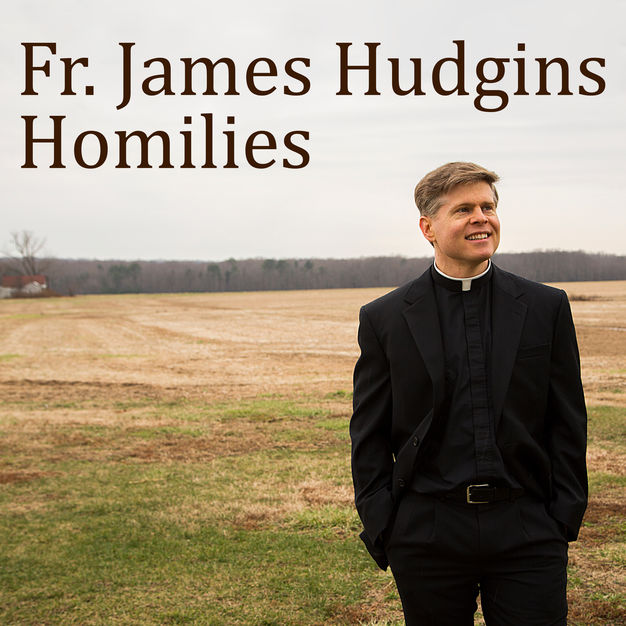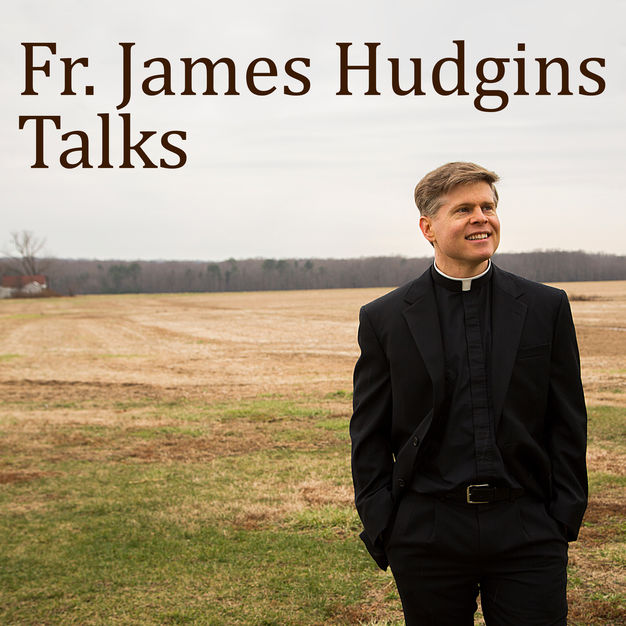
Searching for More
Catholic Diocese of Arlington
Hosted by the Diocese of Arlington, “Searching For More” features interviews and discussions about topics ranging from culture, morality, sexuality, Church history, stories of those who have overcome adversity, the moral implications of public policy, and more. In addition to interviews, some podcasts will emanate from talks, speeches, homilies, and lectures given throughout the Diocese.
- 2 minutes 50 secondsGod is a Father
We are God's children through baptism. No matter what we go through on the day-to-day, God gives us the grace necessary to do what is pleasing to him. We need only rely on him and ask for the grace to call him Father!
Reference: Catechism of the Catholic Church (CCC 301)
Search for More Episodes: https://www.arlingtondiocese.org/searchingformore
18 March 2024, 4:00 pm - 3 minutes 41 secondsYou Can Be a Saint
The Catechism of the Catholic Church describes a saint as "someone who practiced heroic virtue and lives in fidelity to God’s grace." (828) And in the simple words of Mother Teresa, saints are “only sinners who keep trying.” They just knew how much God loved them.
Can that not be us as well?
Do you know the depths of how much God loves you?
Search for More Episodes: https://www.arlingtondiocese.org/searchingformore
4 March 2024, 4:00 pm - 6 minutes 14 secondsHumor & Humility
Should Catholics have a sense of humor? Why is it important and even necessary for us to find things funny and how does that relate to humility?
It's no coincidence that humor and humility share a common route. When we are truly humble, we see the world in its proper proportion. So, when things become out of proportion or incongrous, we can laugh! If we take ourselves lightly, we will begin to notice that that suffering and pains of this life will weigh us down less often.
Growing in virtue is predicated on the knowledge that we are nothing and God is everything. When we undoubtedly fall, our sense of humor allows us to laugh, shake the dust off, and begin anew.
A Christian needs a sense of humor. It provides the very levity required for God to lift us into the heights of heaven.
Reference: Luke 14, Matthew 5
Search for More Episodes: https://www.arlingtondiocese.org/searchingformore
#SearchingForMore #SFM
19 February 2024, 4:00 pm - 5 minutes 10 secondsSaint Scholastica
Has a saint ever found you?
A saint is somebody who finished the race - who fought the good fight - who persevered until the end. Those souls, now fully alive in heaven, are given to us by God as models. St. Scholastica's relationship with her brother Benedict models for us the beauty of communion with one another as we await our eternal destiny.
Think of ways you can establish better communion with those you love. Listen to them as they speak. Do acts of service for them without being asked. Never neglect the fact that they are made in the image of God himself.
Reference: Catechism of the Catholic Church 2030
Search for More Episodes: https://www.arlingtondiocese.org/searchingformore
#SearchingForMore #SFM
5 February 2024, 4:00 pm - 4 minutes 31 secondsDelighting in God's Commands
Imagine if every person in the world obeyed the Ten Commandments.
No lying. No stealing. No murder, cheating, or hate.
Imagine the peace and joy that we would experience! God made us to be in union with him. How does the way that God asks us to live lead us closer to that love?
How can we reframe from our default disposition—how can I get what I want?—to asking a different question: what does God want? God's commands never impinge upon our freedom, but rather they are a blessing, a protection from a loving Father. Ask God for the grace to understand and delight in all that he commands.
References: Psalm 119: 13-16, 33-35 Catechism of the Catholic Church 2057
Search for More Episodes: https://www.arlingtondiocese.org/searchingformore
#SearchingForMore #SFM
22 January 2024, 4:00 pm - 5 minutes 59 secondsA Home for the Lord
Your home is where Jesus lives. Your home is a place where Jesus lives because you live there and he resides in you.
But when we’re home, how often are we reminded that he is with us? Think of ways you can make space for him.
Can you mark the rooms in your home with sacramentals? Get your house blessed by a priest? Explore the Epiphany house blessing?
Reference: Catechism of the Catholic Church 1670
10 January 2024, 4:25 pm - 4 minutes 8 secondsLove is a Verb
Is love, or the virtue of charity, really just a feeling? Can we just think nice thoughts about somebody and truly say that we love them?
Scripture and tradition say otherwise. Love is active, not passive. Being charitable means doing things for those you love even when it costs you something. The greatest example of that is the Cross - when Christ gave his life for us.
Struggling with loving those around you? Think of love as a verb rather than a noun.
"If I speak in the tongues of men and of angels, but have not love, I am a noisy gong or a clanging cymbal." (1 Corinthians 13:1)
References: Catechism of the Catholic Church 1827
John 15:13
Search for More Episodes: https://www.arlingtondiocese.org/searchingformore #SearchingForMore #SFM
19 December 2023, 1:56 pm - 6 minutes 3 secondsHope When It's Hard
How does hope keep us afloat even when things get tough?
Or when it feels like we are enslaved to chronic sin?
Hope sustains us because it is found in Jesus Christ. He became man to save us from our sin so that we might spend eternity with him. His grace is available to us especially in the Sacrament of Confession, when we come to him with a contrite heart, and the Eucharist, where his ultimate sacrifice is recreated time and time again for us to receive him in Body, Blood, Soul and Divinity.
According to the Catechism, this virtue of hope "responds to the aspiration to happiness which God has placed in the heart of every man." (CCC 1818)
So it is accessible not to just a few, but to us all!
So if you're searching for freedom from feeling discouraged, ashamed or abandoned, look no further than Jesus. Know that there is rest for you—rest in the hope found in God alone.
See also: Genesis 15 and Genesis 22
18 December 2023, 6:17 pm - 4 minutes 37 secondsPut Faith
Especially in a season like Advent, it is good to sit with Mary.
The Mother of God models our waiting for Jesus after her waiting. Think how often throughout those nine months she had to put faith in so many: the angel Gabriel. God the Father. Her husband Joseph.
How can you put faith in God this day?
References: Catechism of the Catholic Church 149
Search for More episodes at https://www.arlingtondiocese.org/searchingformore/
4 December 2023, 2:15 pm - 4 minutes 13 secondsBride of Christ
The entire Christian life bears the mark of the spousal love of Christ and the Church. What does this mean?
This spousal love is in fact Jesus' longing to give himself to us through his Church. This love of Christ is reflected not only in the Church but also in our bodies as male and female.
We are made for relationship, made to be given as a gift to another in love.
As a groom waits for his bride, so Christ waits for us.
Will we take another step toward him today?
References: Catechism of the Catholic Church 1616 Book of the Song of Songs
Search for More Episodes: https://www.arlingtondiocese.org/searchingformore
#SearchingForMore #SFM
13 November 2023, 8:32 pm - 3 minutes 45 secondsReal Freedom
"You will know the truth, and the truth will set you free." (John 8:32)
As brought to light in Scripture, truth and freedom are not mutually exclusive. Truth is in fact the birthplace of freedom. When we direct our free will towards the service of the truth, it is then that we more free.
The Catechism defines freedom as a power "rooted in reason and will, to act or not to act, to do this or that, and so to perform deliberate actions on one's own responsibility." Freedom itself is a gift that should be exercised and ever directed towards God. For freedom doesn't simply serve itself, but should always extend beyond our own benefit.
Additional reference: Catechism of the Catholic Church 1731
Search for More Episodes:https://www.arlingtondiocese.org/searchingformore
Searching for More Podcast
30 October 2023, 3:00 pm - More Episodes? Get the App
Your feedback is valuable to us. Should you encounter any bugs, glitches, lack of functionality or other problems, please email us on [email protected] or join Moon.FM Telegram Group where you can talk directly to the dev team who are happy to answer any queries.
 Father Hudgins' Homilies
Father Hudgins' Homilies
 Father Hudgins' Talks
Father Hudgins' Talks
 Arlington Catholic Herald
Arlington Catholic Herald
 Holiness for the Working Day
Holiness for the Working Day
 Catholic Information Center
Catholic Information Center